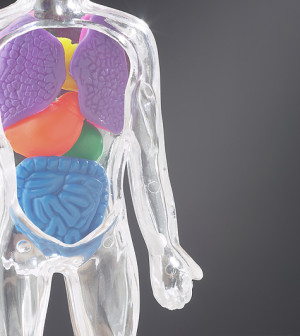- Could Your Grocery Store Meat Be Causing Recurring UTIs?
- Are You Making This Expensive Thermostat Error This Winter?
- Recognizing the Signs of Hypothyroidism
- 10 Strategies to Overcome Insomnia
- Could Artificial Sweeteners Be Aging the Brain Faster?
- Techniques for Soothing Your Nervous System
- Does the Water in Your House Smell Funny? Here’s Why
- Can a Daily Dose of Apple Cider Vinegar Actually Aid Weight Loss?
- 6 Health Beverages That Can Actually Spike Your Blood Sugar
- Treatment Options for Social Anxiety Disorder
Immunity Genes for E.Coli Found

Researchers say they’ve identified immune-related genes that might protect people against E. coli illness.
E. coli is a leading cause of bacteria-triggered diarrhea, and it comes from food, the environment or the intestines of people and animals. But while the bug makes some people extremely ill, it has little to no effect on others, the researchers said.
In this study, researchers exposed 30 healthy adults to E. coli and took blood samples to analyze the volunteers’ gene expression — the extent to which some genes are turned on or off.
When the investigators compared participants who became sick and those who remained well, they found significant differences in the activity of 29 immune-related genes.
“Within each group, there were changes in the patients’ gene expression patterns happening throughout the experiment,” study senior author Dr. Ephraim Tsalik, an assistant professor of medicine at Duke University in Durham, N.C., said in a university news release.
“We found there were differences with the subjects that seemed to predict who would become sick. We interpreted those as signals that show an innate resistance to infection. There may be certain genetic traits that can increase or decrease your chances of being infected after exposure to a pathogen,” he explained.
The study was published recently in the Journal of Infectious Diseases.
The next step is to look at other types of infections, including viral and respiratory illnesses such as the flu.
“We have found a set of immune-related genes to focus on,” Tsalik said. “Now if we can understand how the expression of these genes imparts this resistance and susceptibility, we might be able to offer new ways to boost your immune system to protect against prevalent infections such as E. coli or better predict who is at greatest risk of getting an infection.”
According to the U.S. Centers for Disease Control and Prevention, E. coli illness usually appears within an average of three or four days after swallowing the germ. Illness can be severe and include diarrhea, often bloody, and abdominal cramps.
Most people will recover within a week, but in some the illness can progress to kidney failure. Children under the age of 5, older adults and people with weakened immune systems are at highest risk from E. coli illness, the CDC says.
More information
The U.S. Centers for Disease Control and Prevention has more about E. coli.
Source: HealthDay
Copyright © 2026 HealthDay. All rights reserved.










